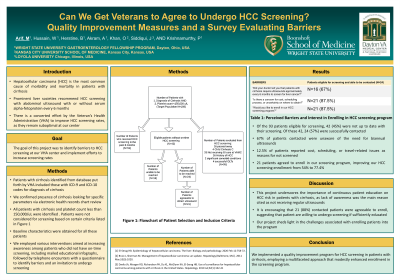Monday Poster Session
Category: Liver
P2416 - Can We Get Veterans to Agree to Undergo HCC Screening? Quality Improvement Measures and a Survey Evaluating Barriers
Monday, October 23, 2023
10:30 AM - 4:15 PM PT
Location: Exhibit Hall

Has Audio

Maaz Arif, MD
Wright State University
Dayton, Ohio
Presenting Author(s)
Maaz Arif, MD1, We'am Hussain, MD1, Blake Herstine, MD1, Aamir Akram, MD1, Omair Khan, BS2, Jaser Siddiqui, BS3, Padmini Krishnamurthy, MD4
1Wright State University, Dayton, OH; 2Kansas City University, Dayton, OH; 3Loyola University, Lincolnwood, IL; 4Dayton VAMC, Dayton, OH
Introduction: Cirrhosis is a major risk factor for hepatocellular carcinoma (HCC), and there is a concerted effort by the Veterans Health Administration (VHA) to improve screening for HCC in patients with cirrhosis. We assessed the impact of a coordinated outreach intervention on HCC screening enrollment within a local Veterans Affairs Medical Center (VAMC).
Methods: Patients diagnosed with cirrhosis and having platelet count less than 150,000/uL were identified through the National VHA database. Their electronic health records were reviewed, and those not up-to-date with their screening received mailed educational materials, followed by phone calls with a brief questionnaire to identify barriers to screening. The primary goal of this project was to enroll as many patients as possible into our screening program.
Results: Among the 188 patients identified, 95 (50.5%) were deemed ineligible for HCC screening for various reasons (i.e active HCC, Cirrhosis Child C, receiving care elsewhere, etc.). Of the 93 patients eligible for screening, 42 (45%) were not up-to-date with their screening. Of these 42 patients, 24 (57%) were successfully contacted . Assessment of screening barriers revealed that 67% of patients were unaware of the need for biannual ultrasounds. Cost, scheduling, and travel- related issues were reported by a minority of patients (12.5%) as reasons for not getting screened. After multimodal contact methods, including mailed materials, phone calls, specialty clinic appointments, and electronic reminders, ultimately, 21 (50%) of eligible patients were enrolled into our screening program.
Discussion: Despite our multifaceted interventions, we were successful in enrolling only 50% of eligible patients into our HCC screening program which reflects the current practical situation and the difficulties associated with recruiting veteran patients for QI projects. Nonetheless, our HCC screening improved overall eligible people enrolled from 54% to 77.4%. More importantly, majority of eligible patients cited lack of education by providers about risk of HCC in cirrhosis and the need for bi-annual liver ultrasound as the reason for not enrolling in the screening program. This project underscores the importance of continuous patient education on HCC risk in patients with cirrhosis and the necessity of regular screening. Given the suboptimal screening rates among at-risk veterans, our study provides a model to modestly improve HCC screening in this patient population.

Disclosures:
Maaz Arif, MD1, We'am Hussain, MD1, Blake Herstine, MD1, Aamir Akram, MD1, Omair Khan, BS2, Jaser Siddiqui, BS3, Padmini Krishnamurthy, MD4. P2416 - Can We Get Veterans to Agree to Undergo HCC Screening? Quality Improvement Measures and a Survey Evaluating Barriers, ACG 2023 Annual Scientific Meeting Abstracts. Vancouver, BC, Canada: American College of Gastroenterology.
1Wright State University, Dayton, OH; 2Kansas City University, Dayton, OH; 3Loyola University, Lincolnwood, IL; 4Dayton VAMC, Dayton, OH
Introduction: Cirrhosis is a major risk factor for hepatocellular carcinoma (HCC), and there is a concerted effort by the Veterans Health Administration (VHA) to improve screening for HCC in patients with cirrhosis. We assessed the impact of a coordinated outreach intervention on HCC screening enrollment within a local Veterans Affairs Medical Center (VAMC).
Methods: Patients diagnosed with cirrhosis and having platelet count less than 150,000/uL were identified through the National VHA database. Their electronic health records were reviewed, and those not up-to-date with their screening received mailed educational materials, followed by phone calls with a brief questionnaire to identify barriers to screening. The primary goal of this project was to enroll as many patients as possible into our screening program.
Results: Among the 188 patients identified, 95 (50.5%) were deemed ineligible for HCC screening for various reasons (i.e active HCC, Cirrhosis Child C, receiving care elsewhere, etc.). Of the 93 patients eligible for screening, 42 (45%) were not up-to-date with their screening. Of these 42 patients, 24 (57%) were successfully contacted . Assessment of screening barriers revealed that 67% of patients were unaware of the need for biannual ultrasounds. Cost, scheduling, and travel- related issues were reported by a minority of patients (12.5%) as reasons for not getting screened. After multimodal contact methods, including mailed materials, phone calls, specialty clinic appointments, and electronic reminders, ultimately, 21 (50%) of eligible patients were enrolled into our screening program.
Discussion: Despite our multifaceted interventions, we were successful in enrolling only 50% of eligible patients into our HCC screening program which reflects the current practical situation and the difficulties associated with recruiting veteran patients for QI projects. Nonetheless, our HCC screening improved overall eligible people enrolled from 54% to 77.4%. More importantly, majority of eligible patients cited lack of education by providers about risk of HCC in cirrhosis and the need for bi-annual liver ultrasound as the reason for not enrolling in the screening program. This project underscores the importance of continuous patient education on HCC risk in patients with cirrhosis and the necessity of regular screening. Given the suboptimal screening rates among at-risk veterans, our study provides a model to modestly improve HCC screening in this patient population.

Figure: Flowchart of Patient Classification
Disclosures:
Maaz Arif indicated no relevant financial relationships.
We'am Hussain indicated no relevant financial relationships.
Blake Herstine indicated no relevant financial relationships.
Aamir Akram indicated no relevant financial relationships.
Omair Khan indicated no relevant financial relationships.
Jaser Siddiqui indicated no relevant financial relationships.
Padmini Krishnamurthy indicated no relevant financial relationships.
Maaz Arif, MD1, We'am Hussain, MD1, Blake Herstine, MD1, Aamir Akram, MD1, Omair Khan, BS2, Jaser Siddiqui, BS3, Padmini Krishnamurthy, MD4. P2416 - Can We Get Veterans to Agree to Undergo HCC Screening? Quality Improvement Measures and a Survey Evaluating Barriers, ACG 2023 Annual Scientific Meeting Abstracts. Vancouver, BC, Canada: American College of Gastroenterology.
